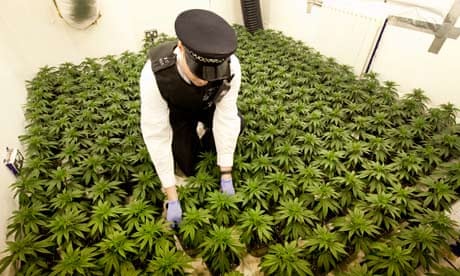Since 2006, the Mexican government has undertaken a US-backed crackdown on drug cartels. Estimates suggest that around 60,000 people have been murdered, and the number of deaths is still rising.
At the same time, in countries like Britain, we're buying more and more of the drugs that flow through Mexico. Our prohibition approach has failed to stop drug use, and it puts money in the hands of narco-terrorists and international criminals.
Despite 50 years of criminalisation, illicit drugs are now the third most valuable industry in the world, after food and oil. Presidents of supply countries, such as Colombia, are desperately calling for a rethink.
We're stuck in a pointless "war on drugs". It's not working and it costs us heavily, in human terms – with people addicted, incarcerated and burgled – and in financial terms. The UK spends more on drug policy than any other country in Europe, but has the highest usage of several class A drugs.
Every person who uses drugs in Britain is treated in exactly the same way: as a criminal and a prisoner. Far too little effort and support is given to treatment; to helping people come off addictive drugs.
Ultimately, we are neither reducing harm, nor reducing demand. Thoughtless, ineffective and costly, drugs policy in this country and across the globe has been a complete shambles.
Today, the cross-party home affairs select committee publishes a report into drug policy. We have spent a year collecting and evaluating the evidence. Our findings are stark.
In short, the government must focus on reducing the damage caused by drugs. That means far more emphasis on effective treatment than on criminal sanction. Turning drug policy into a joint Health and Home Office responsibility, as the committee recommends, would go a long way to achieving that. And we must look to models which actually work.
In Portugal, for example, dealers are still criminalised. Those who possess drugs, however, for personal use, have committed an administrative offence, rather than a criminal one. Instead of courts and jail sentences, users are sent before commissions which combine health policies with rehabilitation. The outcome is tailored to individual cases: treatment for addicts, fines and other sanctions for non-addicted repeat offenders. The prevalence of problem drug use and the number of young people addicted to drugs have fallen. So, too, has the number of users in prison.
Astonishingly, the approach is supported across the Portuguese political spectrum. And the police told us that they preferred the new scheme, and could focus on more serious crimes. Portugal seems to have got it right.
The comparative failure of British drugs policy has led the home affairs committee to call for an independent royal commission. Despite the excellent work of bodies such as the UK Drugs Policy Commission, there has been no proper review of the law since the 1971 Misuse of Drugs Act. The world has changed since then. Politicians are no longer talking about whether we radically alter drug policy, but how. And a royal commission would make recommendations that the government could not just ignore.
For years, drug reform has been a minority interest. With a few notable exceptions, only the Liberal Democrats called for wholesale reform, adopting it as formal policy last year. Now, the home affairs select committee is calling for a change, and this summer a poll showed that six out of 10 people support a complete review of drug policy.
David Cameron recognised the need for change before he became Tory leader, voting for a report detailing how "drugs policy has been failing for decades".
Failure to act now would amount to a display of self-interested politics over evidence. The hypocrisy of the war on drugs must end. The government must help all of us affected by drugs by implementing this report. The time for hardline posturing is over.









